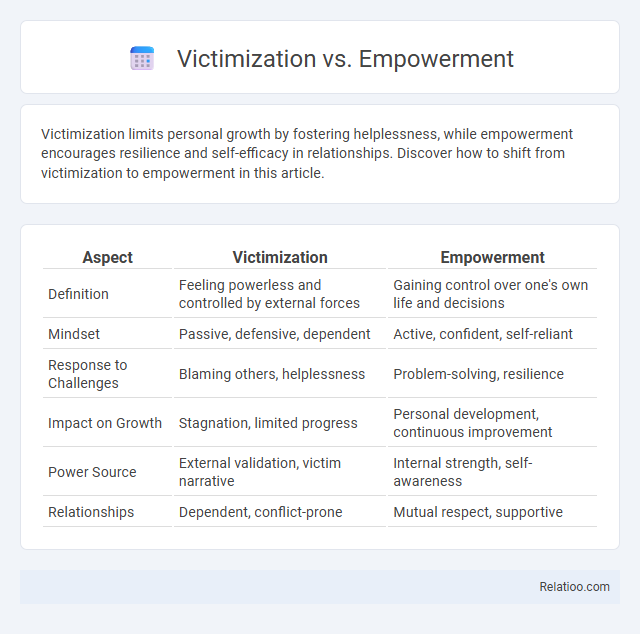Victimization limits personal growth by fostering helplessness, while empowerment encourages resilience and self-efficacy in relationships. Discover how to shift from victimization to empowerment in this article.
Table of Comparison
| Aspect | Victimization | Empowerment |
|---|---|---|
| Definition | Feeling powerless and controlled by external forces | Gaining control over one's own life and decisions |
| Mindset | Passive, defensive, dependent | Active, confident, self-reliant |
| Response to Challenges | Blaming others, helplessness | Problem-solving, resilience |
| Impact on Growth | Stagnation, limited progress | Personal development, continuous improvement |
| Power Source | External validation, victim narrative | Internal strength, self-awareness |
| Relationships | Dependent, conflict-prone | Mutual respect, supportive |
Understanding Victimization: Definitions and Dynamics
Understanding victimization involves recognizing the experiences of individuals who suffer harm or injustice due to external actions or systemic issues, often leading to feelings of helplessness and loss of control. Empowerment contrasts this by fostering resilience, self-efficacy, and autonomy, enabling victims to regain control over their lives and circumstances. The dynamics of victimization encompass psychological, social, and structural factors that influence the transition from vulnerability to empowerment or continued victim status.
Empowerment Explained: Key Concepts and Principles
Empowerment centers on enabling individuals and communities to gain control over their lives, fostering self-efficacy, autonomy, and resilience. Key principles include participation, access to resources, and building capacities that transform vulnerabilities into strengths. This approach contrasts with victimization, which emphasizes helplessness, highlighting empowerment as a proactive process driving social and personal change.
Historical Perspectives on Victimhood and Empowerment
Historical perspectives on victimhood and empowerment reveal shifting societal attitudes toward marginalized groups, highlighting their evolving roles from passive victims to active agents of change. This transformation is evident in social justice movements where narratives emphasize resilience and collective action rather than solely suffering. Understanding these dynamics is critical to fostering policies that promote empowerment while addressing systemic victimization.
Psychological Effects of Victimization
Victimization can lead to severe psychological effects such as anxiety, depression, and post-traumatic stress disorder (PTSD), which may hinder Your ability to recover and regain control. Empowerment, on the other hand, fosters resilience, self-efficacy, and psychological healing by promoting a sense of agency and support. Understanding the contrast between victimization and empowerment is crucial for effective mental health interventions and trauma recovery strategies.
Pathways from Victimization to Empowerment
Pathways from victimization to empowerment involve recognizing trauma, fostering resilience, and accessing support systems that promote healing and personal growth. You can transform experiences of victimization into empowerment by engaging in therapeutic interventions, building social connections, and developing coping strategies that restore control and self-efficacy. Empowerment emerges as individuals reclaim their agency and use their experiences to advocate for themselves and others.
Societal Influences: Culture, Media, and Narratives
Societal influences such as culture, media, and dominant narratives significantly shape perceptions of victimization and empowerment, often framing victims within limiting stereotypes or heroic recovery stories. Cultural norms dictate whether individuals are perceived as passive victims or proactive agents, with media representations reinforcing these ideals through selective storytelling and imagery. Narrative construction in public discourse either perpetuates disempowerment by focusing on victimhood or promotes empowerment by highlighting resilience and autonomy in the face of adversity.
Empowerment Strategies: Tools and Techniques
Empowerment strategies involve tools and techniques designed to increase individual or collective agency, such as goal-setting frameworks, skill development workshops, and access to resources that foster self-efficacy. Techniques like cognitive reframing, assertiveness training, and participatory decision-making enable you to transform feelings of victimization into proactive engagement and resilience. These approaches promote autonomy and capacity building, which counteract the negative impacts of victimization by encouraging positive change and self-advocacy.
The Role of Community in Healing and Empowerment
Community plays a crucial role in healing and empowerment by providing social support, shared resources, and a sense of belonging that counters the isolating effects of victimization. Collective empowerment initiatives foster resilience by encouraging survivors to reclaim their narratives and actively participate in decision-making processes. Through community engagement, individuals transform experiences of victimization into opportunities for growth, advocacy, and sustained recovery.
Barriers to Moving from Victimhood to Empowerment
Barriers to moving from victimhood to empowerment often include internalized blame, fear of change, and lack of supportive networks that reinforce a victim identity. Trauma can impair self-efficacy, making it difficult for you to trust in your ability to overcome adversity and regain control over your life. Overcoming these obstacles requires targeted strategies such as counseling, building resilience, and fostering positive social connections to shift from victimization to empowerment.
Real-Life Success Stories: Overcoming Victimization
Real-life success stories reveal how individuals transformed victimization into empowerment by reclaiming control over their narratives and circumstances. These accounts emphasize resilience, highlighting strategies such as seeking support networks, pursuing personal growth, and advocating for change. Empowerment after victimization often leads to meaningful recovery and inspires others facing similar challenges.

Infographic: Victimization vs Empowerment
 relatioo.com
relatioo.com